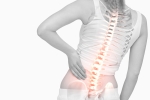Can Cracking My Neck Cause Arthritis?
When you purposely bend or twist your neck, either out of nervous habit or for tension relief, you likely notice a cracking, popping, or snapping sound. You may be wondering, can cracking my neck cause arthritis?
You’re Probably Safe - In most cases, neck cracking is completely harmless. The sound you hear is most likely due to tiny gas bubbles that form and pop in the fluid between your synovial joints. This process, as far as we know, causes no damage to your neck.
























